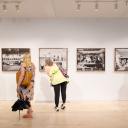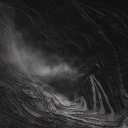Conversations at FAR: A BSO Chamber Concert
On January 19th, 7pm, a BSO Chamber concert will premier Gabriel Lubell's recently finished piece "Nils Magis Mirandum: Industrial Landscape no. 1" at FAR Center for Contemporary Art.
Tickets are $12 - available in advance here or at the door.
The piece has 5 movements and each movement depicts a different piece of water infrastructure: the water reclamation wetlands for Melbourne, an ancient step well India, aeration fountains in NY, the oldest continuously working steam pump in the Netherlands, and water towers in West Africa that gather water from the air. It is a complex and exciting piece. Here are some of Gabe's words about his process.
"As urban society has blossomed, it has had to confront a morass of challenges: too much water, too little, too dirty, etc. Some solutions have been more elegant and effective than others. Yet all invite a kind of wonder: how does it all work? I find the question all the more poignant against the backdrop of mystery that shades much modern infrastructure. Most facilities are off-limits to the public, and an awful lot is entirely invisible. What can be seen suggests entire fantasy worlds and mythologies; just how many alligators, giant goldfish, or (with gratitude to the X-Files) mutant fluke men live in the sewers? More seriously, how many lives and hours were given to let our faucets flow? And what goes on in places where they do not?......I wanted to write music that might do some good for the planet, but didn’t distress people by merely illuminating already known issues. Water infrastructure presented a powerful topic in this regard: as Matthew Gandy put it, “water lies at the intersection of landscape and infrastructure, crossing between visible and invisible domains.” Musicalizing its works could therefore provide oblique (and some direct) reminders of our increasingly troubled relationship to the natural world without succumbing to fearmongering or preachiness. At the same time, it could celebrate the wonderous ingenuity that lies behind our lives, create emotional connections to the inanimate mediators of our lifeblood, and encourage new ideas about futures, pasts, and places both hidden and awesome."

